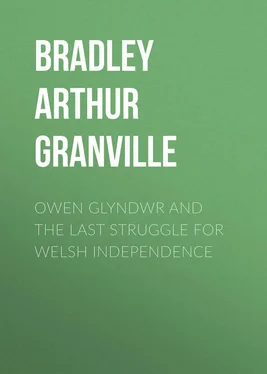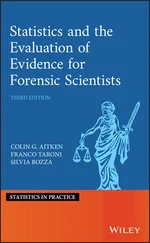Arthur Bradley - Owen Glyndwr and the Last Struggle for Welsh Independence
Здесь есть возможность читать онлайн «Arthur Bradley - Owen Glyndwr and the Last Struggle for Welsh Independence» — ознакомительный отрывок электронной книги совершенно бесплатно, а после прочтения отрывка купить полную версию. В некоторых случаях можно слушать аудио, скачать через торрент в формате fb2 и присутствует краткое содержание. Жанр: foreign_antique, foreign_prose, foreign_language, на английском языке. Описание произведения, (предисловие) а так же отзывы посетителей доступны на портале библиотеки ЛибКат.
- Название:Owen Glyndwr and the Last Struggle for Welsh Independence
- Автор:
- Жанр:
- Год:неизвестен
- ISBN:нет данных
- Рейтинг книги:5 / 5. Голосов: 1
-
Избранное:Добавить в избранное
- Отзывы:
-
Ваша оценка:
- 100
- 1
- 2
- 3
- 4
- 5
Owen Glyndwr and the Last Struggle for Welsh Independence: краткое содержание, описание и аннотация
Предлагаем к чтению аннотацию, описание, краткое содержание или предисловие (зависит от того, что написал сам автор книги «Owen Glyndwr and the Last Struggle for Welsh Independence»). Если вы не нашли необходимую информацию о книге — напишите в комментариях, мы постараемся отыскать её.
Owen Glyndwr and the Last Struggle for Welsh Independence — читать онлайн ознакомительный отрывок
Ниже представлен текст книги, разбитый по страницам. Система сохранения места последней прочитанной страницы, позволяет с удобством читать онлайн бесплатно книгу «Owen Glyndwr and the Last Struggle for Welsh Independence», без необходимости каждый раз заново искать на чём Вы остановились. Поставьте закладку, и сможете в любой момент перейти на страницу, на которой закончили чтение.
Интервал:
Закладка:
After hearing witnesses and taking depositions, the two judges and the priest retired to consider the verdict. This done, the King took counsel with them, and, if he agreed, delivered judgment himself. If the case was too involved, however, for a satisfactory decision, the matter was settled by the simple expedient of single combat. A fixed price, as I have remarked, was set upon almost everything, both living and inanimate. One is surprised, for instance, to find an apple tree worth 60 d. , and a tree planted for shelter worth 24 d. , while a coracle is only worth 8 d. A salmon net is appraised at just double the last amount, while a spade, again, is rated at a penny only. Though the skin of an ox or hart is fixed at 8 d. the near extinction of the beaver is significantly shewn by its value of 120 d. Dogs, too, vary most curiously on the list. A common cur is held at 4 d. , a shepherd dog at 60 d. , and the best sporting dogs at four times the latter sum. There is special mention, too, of chargers, hunters, roadsters, pack-horses, and draught-horses for carts and harrows. Horses are not to be broken till their third year; while three rides through a crowd is the legal test of “warranted broken.” Cows and mares, too, are prohibited from ploughing. We learn also in this singular price-list the current value, among other things, of a battle-axe, a bow with twelve arrows, a white-hilted sword, a shield enamelled with blue and gold; of plaids, too, striped and chequered stuffs, mantles trimmed with fur, robes, coats, hose, buskins, shoes, gloves, caps, bonnets, girdles, and buckles.
There are stringent laws against cruelty to animals and in favour of hospitality. Game laws existed of the strictest kind, classifying every animal of the chase and dealing with the management of hounds, and the etiquette of hunting. For their ardour in these pursuits, the Welsh were distinguished among nations, not being surpassed even by the Normans themselves.
The customs obtaining in the royal household are tabulated in Howel Dda’s code with extraordinary minuteness, and the duties of every official, from highest to lowest, strictly defined; from the Chaplain, Steward, Judge, and Master of the Horse down to the porter and birdkeeper. The perquisites, it may be noted, of the Master of the Horse are all colts under two years old, taken in war, and all gold and silver spurs thus acquired; those of the porter, every billet of wood he could snatch from a passing load, with one hand, as he held the gate with the other, and any swine out of a herd that he could lift breast high by its bristles only!
Of the bards there is so much to be said elsewhere that we need only remark here that the duties of the Bardd Teulu, or Poet Laureate, were to follow the army and sing the “Unbennaeth Prydain” or “Monarchy of Britain” before, and if triumphant after, the battle; to perform at all times before the Court, and also privately to the Queen, only in so low a tone as not to disturb the King and his courtiers. This illustrious functionary was valued at 126 cows.
A remarkable official was the “Crier of Silence,” who beat a particular pillar in the great hall with a rod when the noise became excessive, and had for his perquisites the fines that were exacted for any such undue boisterousness. Strangest by far of all was the King’s “footholder,” whose duty it was to sit under the table at meals and nurse his Majesty’s foot, and to “scratch it when required.”
Nor can we forget the “Pencerdd,” the Chief of Song, who was of popular election and presided at the Bardic Gorsedd held every third year, and held only at Aberffraw in Anglesey, the royal residence of Gwynedd; for the Eisteddfodau were held by all the Welsh Princes apparently at will. The Pencerdd was expected to know by heart the prophetic song of Taliesin. He lodged in the quarters of the heir apparent, and was presented by the King with a harp and key.
Howel the Good died about 950. With the divisions and disputes of his sons and nephews Wales quickly lost its unanimity, and once more the flame of war was lit from one end of the country to the other by these foolish broilers, in attempts to despoil each other of their respective portions. The question was at length settled for a while by a great battle at Llanrwst, where the men of North Wales utterly discomfited those of the South, pursuing them with fire and sword far beyond the northern boundaries of Deheubarth.
Towards the close of the tenth century we begin to get glimpses of those amenities between Cymry and Saxon, which a now common religion, a common foe in the Danes, and considerable private intercourse, had rendered inevitable. We find King Eadgar himself, for instance, at Bangor, helping Iago ap Idwal, Prince of Gwynedd, against his nephew Howel ap Ievan. Everything, however, being amicably arranged, the Saxon King actually remains in friendly fashion at Bangor, and bestows gifts and endowments upon its see. Finally the two recent disputants return with Eadgar to Chester, and take an oar in that celebrated crew of kinglets which rowed the Saxon monarch upon the Dee. Gwaithvoed, Prince of Powys, who was invited to assist in this somewhat inglorious procession, seems to have been the only one of the Welsh Reguli who refused the honour. “Tell the King,” said Gwaithvoed, “I cannot row a barge, and if I could, I would not do so, except to save a life, whether king’s or vassal’s.” On being pressed by a second messenger from Eadgar, his brief answer was: “Say to the King, ‘Fear him who fears not death.’”
It is not easy to define the precise attitude of the Welsh Princes towards the King of England as the Saxon period drew towards its close. Though the ancient Britons had become crystallised into Welshmen, the old tradition of the island as a whole with an “Emperor” in London, and a general scheme of defence against foreign foes, was not yet dead. The Saxons, though little loved, had become an accepted fact, and there seems to have been no particular reluctance among the Welsh princes to pay lip homage, when relationships were not too strained, to the “King in London,” and tribute, too, as representing the ancient contribution to “the defence of the island.”
For the last hundred years prior to the Norman conquest, one follows the bloody path of Welsh history in vain efforts to find some breathing space, wherein rulers turned their attention to something besides the lust of power and the thirst for glory. It was about the year 1000 when the first of the three Llewelyns succeeded to the throne of North Wales. Under a King whose title was absolutely indisputable, and who possessed some force of character, it seemed as if the sword was now for a season, at any rate, to remain undrawn. But it was not to be; for in no long time the throne of South Wales fell vacant, and there was, unhappily, no direct heir. So the nobles of the Province, fearing, and with some reason, that Llewelyn would seize the opportunity to attach the Southern Kingdom to his other dominions, brought forward a creature of their own, a low-born adventurer, who claimed to be of the royal lineage. This precipitated the catastrophe which it was designed to prevent, and Llewelyn fell upon Deheubarth with the whole force of Gwynedd. The fight lasted through a whole day, and the slaughter was immense, but the Northerners again prevailed.
But there were also years of peace under Llewelyn ap Seisyllt, and of conspicuous prosperity, so the chronicler tells us, in which “the earth brought forth double, the people prospered in all their affairs, and multiplied wonderfully. The cattle increased in great numbers, so that there was not a poor man in Wales from the south to the north sea, but every man had plenty, every house a dweller, every town inhabited.” Llewelyn fell ultimately before Carmarthen, and his throne was seized by Iago ap Idwal, a collateral relative. He in turn was quickly overthrown and slain by Llewelyn’s warlike son Griffith, who enjoyed what from a purely military point of view might be called a successful reign.
Читать дальшеИнтервал:
Закладка:
Похожие книги на «Owen Glyndwr and the Last Struggle for Welsh Independence»
Представляем Вашему вниманию похожие книги на «Owen Glyndwr and the Last Struggle for Welsh Independence» списком для выбора. Мы отобрали схожую по названию и смыслу литературу в надежде предоставить читателям больше вариантов отыскать новые, интересные, ещё непрочитанные произведения.
Обсуждение, отзывы о книге «Owen Glyndwr and the Last Struggle for Welsh Independence» и просто собственные мнения читателей. Оставьте ваши комментарии, напишите, что Вы думаете о произведении, его смысле или главных героях. Укажите что конкретно понравилось, а что нет, и почему Вы так считаете.












